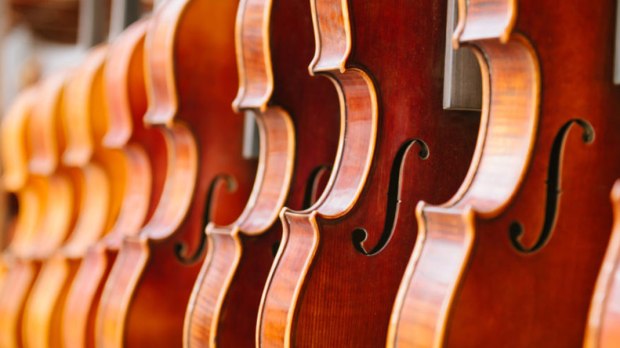It never occurred to me to evaluate the kind of music I listen to until my mom sent me an interesting article several months ago. It detailed the effects that different types of music had on the designs of water when it was frozen. Classical music resulted in the formation of gorgeous water crystals resembling snowflake designs. Rock music, on the other hand, caused the water to freeze into uneven, cracked patterns.
If this was the result of music on water, I figured it was worth knowing what sort of effect classical music could have on me. After all, a lot of the modern, catchy songs I listen to don’t contain the cleanest of lyrics. I also knew that many of the greatest classical composers attributed their masterpieces to their worship of God. Johann Sebastian Bach once said, “The aim and final end of all music should be none other than the glory of God and the refreshment of the soul.”
Surprisingly, I found that classical music provides its listeners with a number of benefits, both physical and psychological.
1. It boosts brain power and creativity
Craig Ballantyne, editor of the self-improvement website Early to Rise, explains the “Mozart effect” as a mental result of listening to classical music, particularly Mozart’s. “In a controlled University of California study, students who listened to 10 minutes of Mozart before taking SATs had higher scores than students who didn’t,” explained Ballantyne. He also pointed to a study done by the University of Washington in which copyeditors who listened to classical music while editing caught 21 percent more errors than those who did not.
Author Cinda Yager raves about the psychological effect that classical music had on her. “Encouraged by the music, my imagination came out to play. It played through scenes in the novel I was working on, presenting solutions to problems, giving me ideas to flesh out characterizations, suggesting necessary edits I had not seen before. This was amazing to me.”
2. It deepens musical appreciation
After recently running into an old teacher of mine, the topic of music genres came up. I was surprised to learn that he preferred classical music over all others. “I used to hate it,” he admitted. “So one year for Lent, I gave up listening to every type of music besides classical. But by Easter, I didn’t want to listen to anything else.” When I asked him why he explained that other types of music just sounded like loud noise. “There’s no depth to the melodies of modern music,” he said. “When you listen to classical, you lose yourself in it.”
Although I’ve been listening to classical music pretty consistently for a few weeks now, I do still enjoy the rock, pop, and country tunes I’ve always gravitated toward. I believe my teacher had a point, though. The instrumentals contained in classical music are unlike those of any other genre in their ability to reach a person. Fittingly, Albert Einstein once said that Mozart’s music “was so pure that it seemed to have been ever-present in the universe, waiting to be discovered by the master.”
3. It has healing properties
If the sound of classical music results in water’s formation of elegant ice crystals, one has to wonder what it can do for our bodies, which are made up of 70 percent water. The man responsible for the study, Dr. Masaru Emoto, “sees energy as vibrations moving through matter.” These vibrations include the sound waves of music, which can affect us in various ways. Dr. Emoto refers to the vibrations as hado.
He gives several examples of specific classical songs and their healing effects, starting with Moldau by Bedrich Smetana. Evidently, the hado contained in this piece energizes the lymphatic tissues of one’s body. Similarly, Johann Strauss II’s Blue Danube can revitalize the central nervous system, Dr. Emoto has found.
4. Acts as a stress reducer
PsychCentral reported that classical music “can have a beneficial effect on our physiological functions, slowing the pulse and heart rate, lowering blood pressure, and decreasing the levels of stress hormones.”
One of the things I noticed when I started playing classical music in the car with my one-year-old was that she whined less and jibber-jabbered more. Like most toddlers, she prefers to be on the move and doesn’t normally do well in the confinement of the car seat. When I used to play whatever was on the radio or even children’s songs, she would get fussy after only a brief ride, which in turn would cause me stress from the driver’s seat. Although it’s not necessarily a perfect solution, I have definitely noticed that she’s more relaxed with classical tunes coming through the speakers.
5. It aids in expressing one’s emotions
Southern Methodist University conducted a study in which 85 individuals were asked to verbally reflect upon their life’s most significant experience. The participants whose interview involved classical music playing in the background were found to be more expressive and detailed in their reports. This is because classical music is “cognitively and in turn emotionally arousing,” the report concluded.
Having trouble articulating your feelings? Try listening to some Mozart or Beethoven and see if it helps you express your deepest self.
It’s unfortunate that classical music has so dramatically declined in popularity over the centuries. Society’s taste in music will be forever changing, especially as advancements in technology make aptitude in musical instruments obsolete. There are still few things as precious, however, as enjoying a classical piece of music that involves the timeless sounds of instruments that can play right to our innermost being.

Read more:
How to get kids interested in classical music

